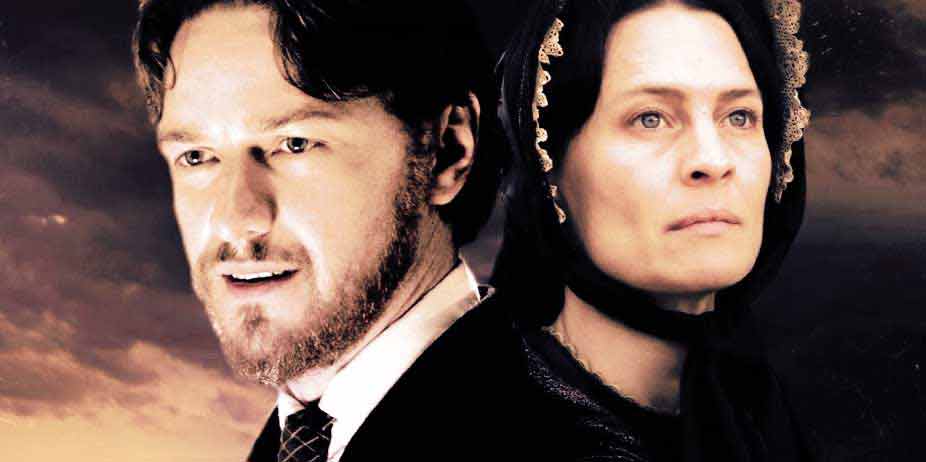
The Conspirator (2010)
Everyone who has ever sat through a history class knows about the assassination of President Abraham Lincoln, but few non-historians have known the intimidate details of the tribunal trial that took place immediately afterward... until now.
With the South about to surrender, Captain Frederick Aiken (James McAavoy) and his Union friends have returned home for a celebration. The exuberance of the evening and of him being reunited with the lovely Sarah Weston (Alexis Bledel) are rudely and horrifically interrupted when a shot rings out at Ford's Theatre across the street, and the prone body of the president is carried out. The conspirators flee on horseback but the army soon catches up with them, and all suspects are rounded up and imprisoned, among them Mary Surratt (Robin Wright), at whose boardinghouse many of the plans were devised. Senator Johnson (Tom Wilkinson) at first takes her case, but as an old Southerner, knows she will have no chance of a fair trial unless a Union lawyer represents her -- so he approaches Aiken, who is reluctant to defend a woman responsible in part for the assassination of the president.
But as time goes on and he digs deeper into her associations with Booth and others, it becomes more and more evident that the conclusion of the trial has been pre-arranged. Eventually, Aiken is battling not for her life but for the Constitutional right for a trial before a jury of peers, a fact that puts him at odds with Sarah, many of his friends, the prosecutor, and especially Edwin Stanton (Kevin Kline). Though this is touted as a movie that is completely historically accurate, it's not -- and some of the changes I'm not sure why they were made. In real life, Sarah and Aiken were already married; it seems to me that including this would have made his struggle all the more apparent, knowing not even his wife supported his cause. Other historical flubs (including John Wilkes Booth not catching his spur on the ribbon of the president's box as he leapt onto the stage) are present, but most will go unnoticed except by enthusiasts of the era. Overall, the movie's underlining principles are excellent, about a man who places Constitutional law above his "liking" for his client -- whether or not she did it, whether or not he likes it, she deserves a fair trial.
McAvoy is always good but here he is especially so, and surrounded by a group of fine actors that include Evan Rachel Wood, Colm Meaney, and Danny Huston. I hate to say it but I think the only miscast actor involved was Alexis Bledel -- there's something off in her performance, it seems too repressed and forced. It's possible the blame for that can be laid at the director's feet, because in spite of a terrific script and plot, there's no spark in this film, nothing that truly makes it gripping. Something is off in the direction that beautiful costumes and fine acting cannot undermine; it's a pretty film to look at, and does have its moments of intensity and passion, but it seems to amble a bit in its narrative. I cannot put my finger on it, but there is an element missing that would have made me eager to revisit it again. That aside, as a historical piece and straight up drama, it's enjoyable and maddening. Much has been said elsewhere about it being a thinly veiled propaganda piece but it merely tells the facts, and the facts are that this was an unjust trial with a predetermined outcome.
In terms of content, there are two uses of the word s**t and a few mild abuses of deity that feel quite out of place. There's no sensuality but the violence is more prevalent -- the first fifteen or so minutes of film are dedicated to Lincoln's assassination and the attempt on William Seward. We hear the gunshot but do not see the result; basins full of blood and bloodied rags are carried around the house. An assassin stabs someone in Seward's home multiple times, then shoves his wife across the room, and climbing on top of the invalid man, repeatedly stabs him (many of the blows are misdirected by the neck apparatus he is wearing); we see John Wilkes Booth shot in a burning barn; four people are hanged and we see them fall off the platform and their bodies jerk upward with a snap. Ongoing is a running theme of duty and honor vs. prejudice, and some of the antics in the courtroom will have you shouting at the screen. I did not feel that the movie attempted to vindicate Mary Surratt as much as reveal the nature of the trial, and outline an outcome that many believe Lincoln would not have approved of.
Some have criticized this production for being one-sided in its depiction of the Union, but I think that is unfair: while the Union officers on duty around the Surratt house are reluctant to protect the occupant, many of them are under orders, and not everyone involved comes across as a scoundrel. I don't think there is much to offend conservatives unless they intentionally go looking for it. It is a bleak story of judicial injustice but very well written and an entertaining and educational way to spend your evening.
